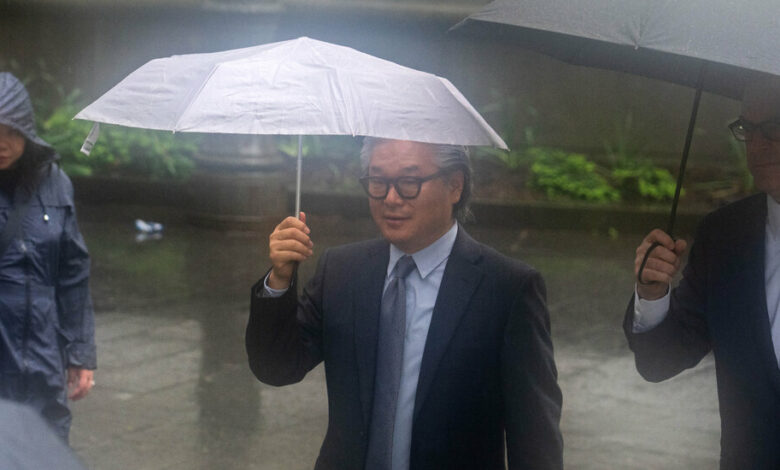Archegos founder’s trial for billion-dollar fraud nears end

The collapse of Archegos Capital Management in the spring of 2021, which caused billions in losses for a handful of Wall Street banks, was the result of “lies and manipulation” by Bill Hwang, the firm’s founder, a federal prosecutor told a Manhattan jury on Monday.
During his plea, prosecutor Andrew Thomas said Hwang defrauded banks and other traders in the market by artificially inflating stock prices to increase the size of Archegos.
Barry Berke, Mr Hwang’s lawyer, said the government only criminalized his client’s risky trading because it resulted in losses for the banks that had lent him billions of dollars.
“Mr. Hwang bet on companies he believed in,” Mr. Berke said. “That’s not manipulative.”
Mr Hwang, 60, is accused of 11 counts of securities fraud, wire fraud, conspiracy, extortion and market manipulation. If convicted on all counts, he could spend the rest of his life in prison.
The sudden collapse of Archegos not only caused nearly $10 billion in losses for Wall Street banks, but also wiped out a large portion of Mr. Hwang’s personal fortune. The firm, which Mr. Hwang founded in 2013 as a family office, was little known on Wall Street at the time, even though it employed a few dozen people and invested tens of billions of dollars in the stock market.
At its peak, Archegos managed $36 billion for Mr. Hwang and his family, and held stocks worth more than $100 billion. The firm, which operated like a hedge fund but with limited regulatory oversight, amassed such large positions by using sophisticated derivatives and borrowed money from Wall Street banks to inflate its holdings.
But in March 2021, everything came crashing down in three days when the prices of some of those stocks began to plummet and the banks demanded that Archegos pay them back.
The courtroom in Manhattan federal court was packed for closing arguments, with many of Mr. Hwang’s supporters present. Damian Williams, the U.S. attorney for the Southern District of New York in Manhattan, was present for part of the proceedings.
The trial, which began in early May, featured testimony from 21 prosecution witnesses. Prosecutors introduced into evidence numerous internal email communications and text messages between Archegos employees. They also played several recorded conversations between Archegos traders and employees of the Wall Street banks that had given the firm access to billions of dollars to make trades.
In his closing argument, Mr. Thomas presented to the jury significant portions of witness statements and some of Mr. Hwang’s text messages and emails. He told the jury that Mr. Hwang’s many text messages “were like leaving fingerprints at the scene of a crime.”
Mr. Hwang, whose legal name is Sung Kook Hwang, did not testify at trial, nor did Mr. Hwang’s co-defendant, Patrick Halligan, the former chief financial officer of Archegos.
The prosecution’s case revolved around allegations that Mr. Hwang and Mr. Halligan misled banks, including Credit Suisse, UBS, Morgan Stanley and Goldman Sachs, about the firm’s overall footprint in the market. Mr. Thomas told the jury that Mr. Hwang had “attempted to artificially manipulate the prices” of the firm’s portfolio of stocks.
“Hwang sued Archegos through fraud and Halligan assisted him in doing so,” Mr. Thomas told the jury.
Two former Archegos employees who pleaded guilty and cooperated with authorities were key witnesses.
Scott Becker, the firm’s former chief risk officer, testified that it was his job to lie to the banks about the size of Archegos’ holdings and loans so that the banks would continue to lend to the firm. But under cross-examination, he said that Mr. Hwang never specifically told him to lie.
Timothy Haggerty, a lawyer for Mr. Halligan, said in his closing argument that without Mr. Becker’s testimony, prosecutors had no case against his client. He said that Mr. Becker had lied about Mr. Halligan’s role in Archegos and reminded the jury that Mr. Becker had admitted that he hated Mr. Halligan.
William Tomita, a former top trader for Archegos and the government’s other key witness, testified that Mr. Hwang instructed him on how to a misleading image for banks about the company’s shares.
Mr. Tomita also testified that Mr. Hwang had placed large buy orders at the end of the day to drive up stock prices. He said Wall Street banks had used the closing price of those shares to determine how much money the company could borrow.
Mr. Hwang’s legal team attempted to undermine the two key associates during cross-examination and with expert testimony that attempted to offer a more benign explanation for Archegos’ excessive stock buying. Mr. Hwang’s team called only two witnesses.
In his closing argument, Mr. Berke said a weakness in the prosecution’s case was that Mr. Hwang and Archegos never “cashed out” after building large stock positions.
Ultimately, the impact of Archegos’ failure on the broader stock market was limited. But the firm’s collapse shed light on Wall Street’s practice of rampant lending to hedge funds and large family offices and the risk that could entail.
Gary Gensler, chairman of the Securities and Exchange Commission, told a group of reporters at The New York Times last month that he was concerned about the extent of hedge funds’ borrowing to make trades. He did not comment specifically on Archegos or Mr. Hwang’s lawsuit.
The federal judge overseeing the case, Alvin K. Hellerstein, plans to instruct the jury on the law on Tuesday and then turn the case over to them for decision.
The lengthy trial focused largely on obscure topics, but it also included a few lighter moments. Early in the proceedings, Judge Hellerstein, 90, interrupted a witness’ testimony to announce that he had just learned he had become a great-grandfather. Everyone applauded, including the lawyers and the jury.




